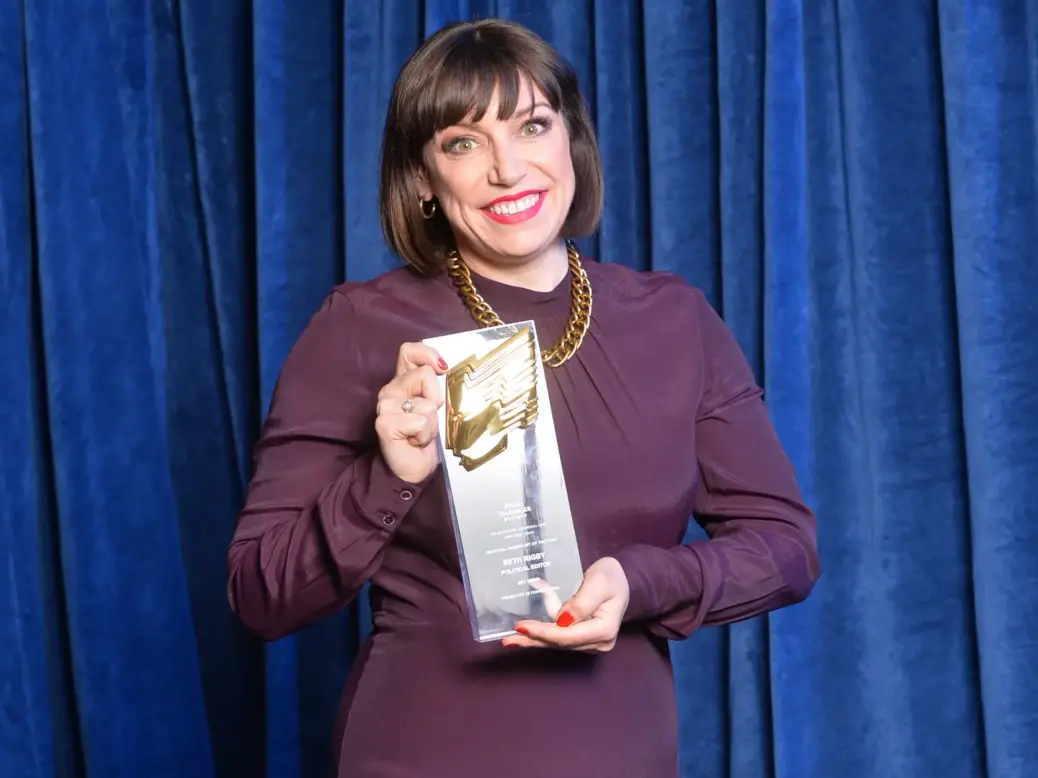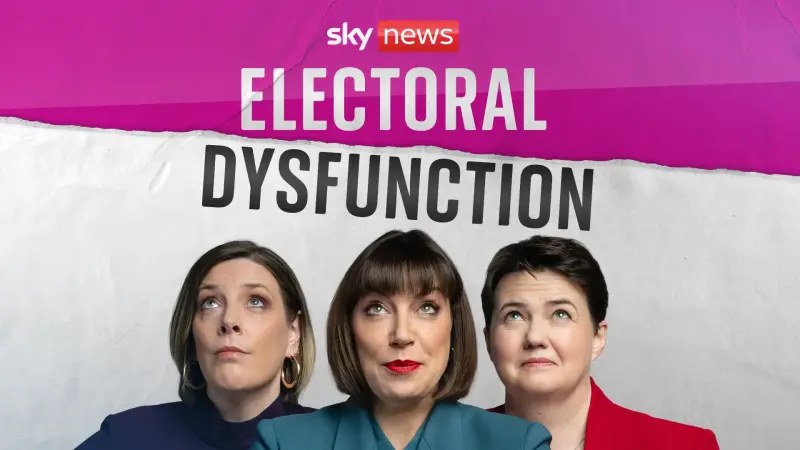
Sky News podcast Electoral Dysfunction, which launches today (Friday 1 March), is aiming to “try and attract people in that don’t necessarily live and breathe politics” – host Beth Rigby explains.
The channel’s political editor saw an opportunity for something with an all-female line-up (she was previously lambasted for wrongly saying there wasn’t an all-female UK politics podcast and now clarifies “there isn’t one, should I say, in the top ten of the podcast political charts”) and something that gets out of Westminster a bit more (although she didn’t want to sound “hackneyed” about that).
Rigby will co-host alongside Labour MP Jess Phillips and former Scottish Conservative leader Ruth Davidson, who now sits in the Lords. Rigby says they are both “really interesting people to listen to, that have something to say and they’re not going to just tow a party line or spin a line”.
In fact, she says she “struck gold” that two women at the top of her wishlist had the appetite to do it and were available – she admits she phoned Phillips the very next day after the MP resigned from the shadow cabinet in November so she could vote for a ceasefire in Gaza.

This combination of practitioners and journalists is unusual in political podcasting where it is frequently a pairing of one or the other – think ex-Labour spinner Alastair Campbell and ex-Conservative cabinet minister Rory Stewart together on The Rest Is Politics and former chancellor and shadow chancellor George Osborne and Ed Balls on Political Currency, or Politics At Jack And Sam’s with Politico’s Jack Blanchard and Sky News deputy political editor Sam Coates.
Rigby, who was named Political Journalist of the Year at the RTS Television Journalism Awards on Wednesday, says both types of pairing leave something wanting. Of the practitioners, she says “it’s really fascinating, especially if you’re a political journalist, but actually I was like I would like to insert someone into that to slightly test what they’re saying or throw something in that’s a question that might take that answer in a different way.
“And then when I listen to ones that are journalists, again I love them, but actually I don’t want to just listen to the people with their nose pressed up against the glass. I want to listen to the people that are actually doing it, because that gives me an insight I don’t have.”
Podcasts provide a chance to ‘explain nuance’
Instead Electoral Dysfunction will have Phillips, who is still in the thick of things having just come off the frontbench and with her party likely to enter government this year, and Davidson, who is from a “particular wing of the Conservative Party at a time when there’s a sort of battle for the soul of the party”. Then there’s Rigby, who has “interviewed them all, I’ve been around the blocks. I’m living and breathing what’s going on. So I can ask them pertinent questions.”
The politicians can both also bring in stories from their own constituencies or regions of the UK to help the podcast break out of the Westminster bubble, Rigby adds.
“My hope is that by bringing together these two people, and then I sit in the middle, that hopefully it’s something quite compelling and fresh.”
Although Electoral Dysfunction is a new podcast, Rigby has previously hosted the weekly Beth Rigby Interviews… in both podcast and TV form until last summer. That show ended, she says, so she could concentrate on “pure politics” ahead of the anticipated general election.
“A political editor trying to ride two horses – I was probably going to fall into the middle on my face. And we decided that’s a bad look.”
Although it will discuss serious issues and policies, the podcast will be an opportunity to “have a laugh” at the same time (as the name may suggest).
Her day job sees her in serious mode, bringing the required “gravitas of a political editor and authority”.
But she admits this means “some people, when they meet me in real life, say things like ‘you’re much friendlier than I thought'”.
TV political reporting is “quite formal, and it’s also quite constrained,” she says. “You’ve got two and a half minutes to do your live link. They always tell me off for going over.”
Many people feel disillusioned with politics, Rigby says, and part of the problem may be the lack of opportunity to “explain nuance” when everything gets clipped up in small soundbites and and a journalist is trying to get something specific out of an interviewee.
She adds this is “not helped by the fact that politicians rhetorically sometimes try and, for political purposes, boil quite complicated arguments down to quite black and white things which they’re not – so, you know, you’re either pro-green or you’re anti-green or you’re pro-woke or you’re anti-woke and obviously it’s never as simple as that”.
Rigby says newspaper interviews need to create a news line so you can splash a new development on the front page while broadcast interviews have a “performative element” where you are trying to reveal something – even if it that’s because the interviewee is dodging a question. But a podcast, she adds, draws people in by making them feel like they’re sitting in on a conversation between people with whom they might like to spend time.
She is “encouraged” by the seemingly “massive appetite” for podcasting and long conversations with more nuance and understanding.
“I find it reassuring that people want to listen to an Andrew Sullivan podcast, which is a very long interview, or they want to go and tap into Nick Robinson’s Political Thinking – I do think people have an appetite to better understand issues… I think it’s also sometimes quite hard to physically sit down and watch half an hour of a television interview, whereas actually listening to someone having a conversation, it enables you to do that in a way where you can get on with your everyday life. So I think it’s quite an attractive way to do it.”
Beth Rigby: ‘I just want to dish up politics to everyone’
Rigby, Phillips and Davidson recorded several pilots of the new podcast and the journalist says she loved “that you can chat, you’re not worried about time. It’s very informal. It’s not prosecutorial at all in how you’re structuring an interview, you’re trying to have a genuine conversation where there’s more light than heat. So it is a different medium through which to explore politics.”
This is why Rigby wants Electoral Dysfunction to be a “positive contribution” to UK politics and why, she says, “I’m not going to be cynical. I might be sceptical, but it’s not about being cynical and talking everything down.”
Rigby adds: “It’s a new medium for me in a way to share politics and my love of politics with an audience that maybe don’t watch on television, but they might want to listen on a podcast and they might like the sound of Jess or they might like the sound or Ruth so it means that we can hopefully reach new audiences and new people.”
Her aim is to help people to “engage a bit more, even if it’s just a few thousand people”. Labour leader Keir Starmer has said voter apathy is one of the biggest challenges for the upcoming election.
“I love politics,” Rigby says. “I just want to dish it up to everyone in every which way I can. So if I can get people to see a less formal, I suppose, side of political journalism as well, I would love to be able to do that. So we’ll see if it works. But it is fun. Honestly, it’s quite rude as well.”
However Rigby returns to her more serious TV demeanour when sharing her fears about the risks of AI and deepfakes in the upcoming elections this year.
She first started thinking about the threat to democracy from AI after interviewing Dame Wendy Hall, who sits on the Government’s AI council, last year. The first real example she encountered in her reporting was when fake audio of Starmer supposedly showing him abusing staffers circulated during the Labour party conference.
Rigby saw through it straight away, but confirmed it was fake with Starmer’s team, and was reassured that politicians from all sides called it out straight away – and that, more recently, the tech giants have created units – or “war rooms” – to start tackling such misinformation. “But it was a stark reminder or red flag as to how pernicious this can be,” she says. “I am really worried about it going into an election.”
She adds: “Journalistically, for me, what can you do? You can be very vigilant, you can make sure you check everything and you can alert people be that within my organisation or political parties if you see something. But it also has to be top down. It has to be the tech giants really trying to tackle it.
“News organisations like our own can build our own units and we do all our checking and we’re very careful in terms of verifying information, but it really does have to come from the big tech giants to tackle this.”
What does Beth Rigby listen to?
Rigby claims to have been a “bit of a late starter” on podcasts.
But she appears to have caught up now. Asked what she listens to she reels off a long list of titles, many of which she enjoys while running.
She gets stuck into crime podcasts like S-Town and Hoaxed by Tortoise while The New York Times Daily keeps her abreast of the big stories. She loves Grounded with Louis Theroux, particularly the episode with his cousin Justin Theroux, and was fascinated by Last Man Standing from The Times in which war correspondent Anthony Loyd investigates what happened to missing British photojournalist John Cantlie.
Off Air… with Jane and Fi makes her laugh. Elizabeth Day’s How To Fail with Stanley Tucci talking about the loss of his first wife made her cry.
She ends the list by saying: “I listen to more podcasts than I realised.”
For a political editor who is about to launch her own political podcast there are notable titles missing in that list – anything covering UK politics, which she tends to avoid because she is immersed in it all week.
It’s far from a gap in her knowledge though: over the Christmas break she listened to “every single variant” of a UK political podcast. “I listened to them all – I mean everything.”
Before this research Rigby had feared the market was saturated. But listening to her potential rivals she began to feel differently, in part because she realised people who are interested in politics could listen to these types of conversations “endlessly”.
Email pged@pressgazette.co.uk to point out mistakes, provide story tips or send in a letter for publication on our "Letters Page" blog
